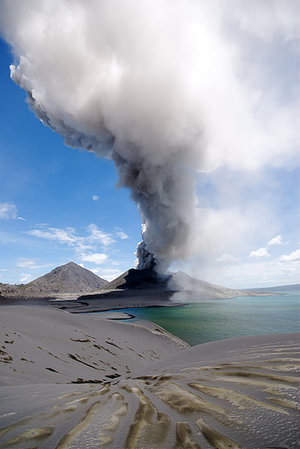Scientists to Begin Testing Artificial Volcano to Curb Climate Change
Researchers in the U.K. will begin an experiment next month that, by imitating a volcanic eruption, could eventually lead to a climate-cooling method that would work by putting sun-reflective particles into the stratosphere.
Researchers in the U.K. will begin an experiment next month that, by imitating a volcanic eruption, could eventually lead to a climate-cooling method that would work by putting sun-reflective particles into the stratosphere.
The geoengineering experiment, which during its first phase of testing will shoot water into the air through a kilometer-long hose suspended in the air with a hydrogen balloon, was inspired by the eruption of Mount Pinatubo in the Philippines in 1991. That volcano shot 20 million tons of sulfate particles into the atmosphere, ultimately cooling Earth by 0.5 degrees Celsius for 18 months.
But scientists believe it will be decades before they can safely implement such a cooling strategy, and even then, they warned, it should not be used as an excuse to avoid cutting greenhouse gas emissions. Rather, geoengineering should be considered a short-term emergency remedy. –BF
Your support matters…Scientific American:
The water tests are expected to be harmless, but several environmental groups have criticized the plan—and geoengineering in general. Last year, the United Nation’s Convention on Biological Diversity issued a statement forbidding geoengineering research that may impact biodiversity. The U.K. accepted that statement, but the SPICE [Stratospheric Particle Injection for Climate Engineering] experiment does not violate any international agreements due to its small scale, says Jason Blackstock, a physicist at Canada’s Center for International Governance Innovation.
Nevertheless, the Canada-based Action Group on Erosion, Technology and Concentration (ETC) is calling the tests internationally irresponsible. In a written statement, they called on the British government to shut down the project, adding: “This experiment is only phase one of a much bigger plan that could have devastating consequences, including large changes in weather patterns such as deadly droughts.”
Independent journalism is under threat and overshadowed by heavily funded mainstream media.
You can help level the playing field. Become a member.
Your tax-deductible contribution keeps us digging beneath the headlines to give you thought-provoking, investigative reporting and analysis that unearths what's really happening- without compromise.
Give today to support our courageous, independent journalists.






You need to be a supporter to comment.
There are currently no responses to this article.
Be the first to respond.